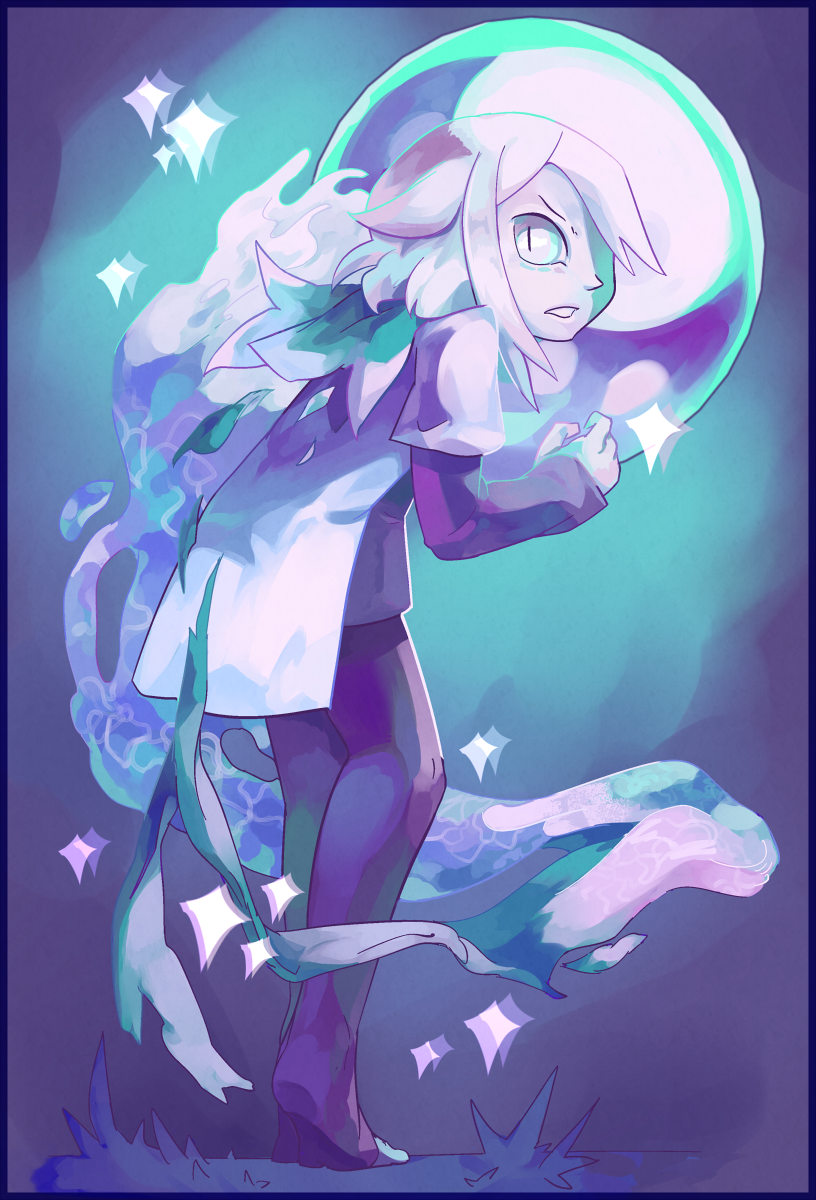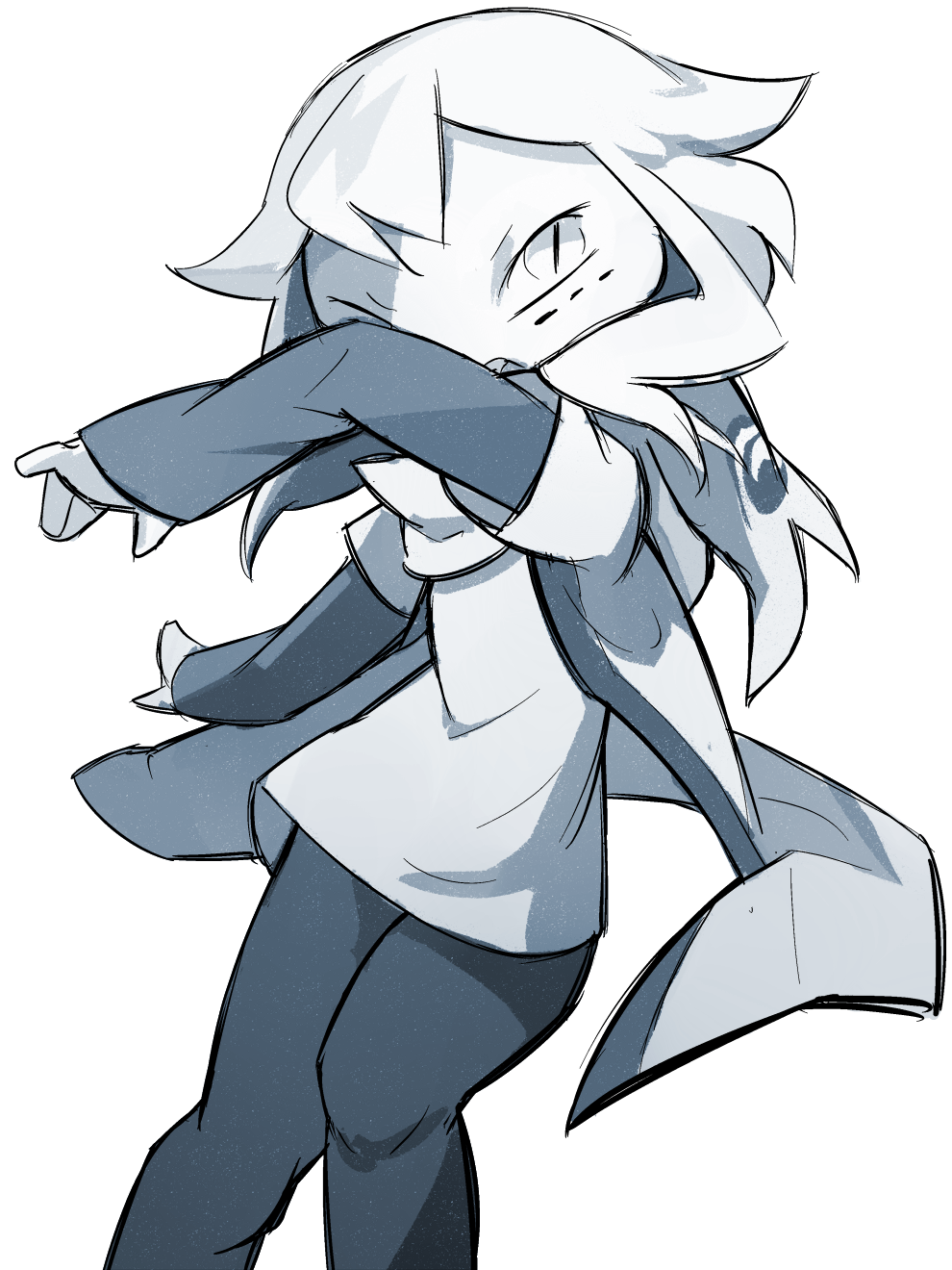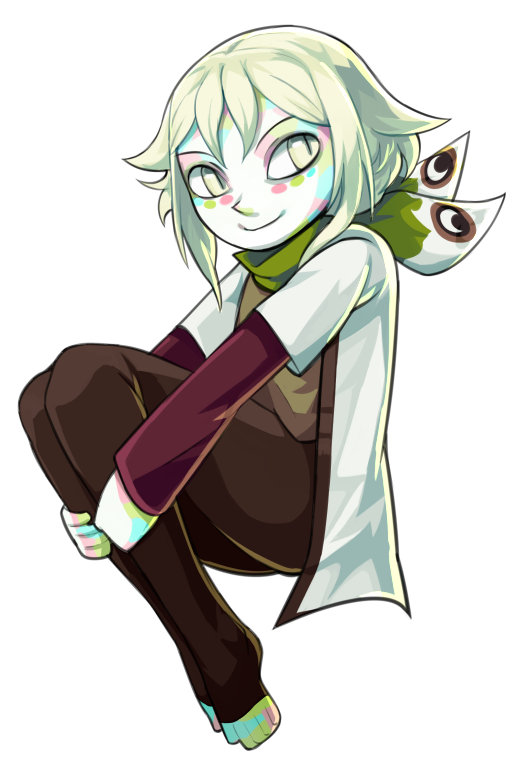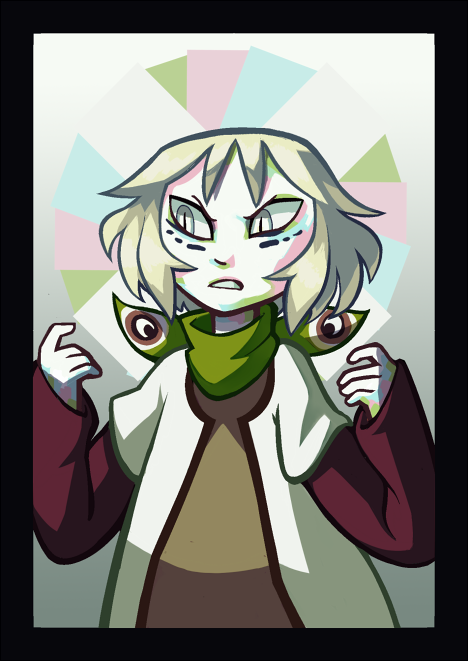arsene
overview
Arsene is an abomination on the face of existence. The tragedy is that the error isn't even his fault — and yet the problem is so great that there is no hope, no chance, and absolutely no circumstance he could ever escape his predicament.
Predicament? Error? What? Sure, he knows there's some problems with his behaviour... but that's just him having a bad personality. And sure there's questions about where he is and how he's here, but given that he is here, does that stuff really matter? Do we have to talk about it? Can't we just enjoy what we have? Because as far as Arsene cares, all that matters, all there is to talk about, and all there is to enjoy, is all the ways his master is amazing.
Arsene is the embodiment of primordial nothinginess, who came into existence in a void and helped make the world as the Demiurge's servant. Lacking any substance in himself, Arsene is obsessed with the Demiurge and needs his constant attention to stave off the all-encompassing sense of worthlessness festering inside him. This worked fine for eons as the love was reciprocal, and stopped working fine once the Demiurge made another thing he adores near as much as Arsene: humans.
Furiously envious of humans, Arsene has been ignited with a hatred toward them that, despite his master's affection for the creatures, and despite his own desire to keep his master happy, has only ever been growing...
Even if it means doing something irreversible, that would separate him from his master forever...
They're just so gross and stupid, and the feeling's so hard to restrain...
story
Arsene opened his eyes and saw nothing.
Up and down, forward and back, left and right, the nothing stretched without end. No horizons shaped its vastness, but equally no walls held its span. Arsene simply knew that it went on forever because it did go on forever.
He kicked and clawed but touched nothing. If his struggling pushed him to anywhere, it was only to nowhere, full of more nothing. He could move an inch or a mile, but his surroundings stayed identically empty. The infinite space he inhabited might as well be a cramped little room.
A stranger wreathed in crimson appeared beside him, reclining. In a voice pristine as a polished bell, he said, “Hail, ikisat, my other. Do you claim these wastes? Is yours the tilling hand? Shall you see cause made of this void?”
So Arsene told him. Apart from the stranger, he just saw nothing.
“Indeed.” The stranger whirled gaily, and grinned. “Then I am the architect, for I see a canvas.”
With a single flick of Camellia’s finger, a blazing red light ripped through the emptiness. It solidified into a floor upon which they stood, its bounds stretching far into the night. Arsene tested his heel against the ground as Camellia then watched with a smile. The aura around Camellia flared radiant as a sun, warm and glorious, and from that moment, Arsene knew he’d discovered the most beautiful thing in the world.
They situated themselves with a plan. Arsene was Camellia’s servant. They’d live together, in this place which was Our Home. They would fill Our Home with things they found pleasant and beautiful, and build an excellent world in which to bask. While Camellia conceived many such pleasant and beautiful things, the only thing Arsene conceived when he imagined beauty was the sight of Camellia smiling. So he would fill Our Home with that, he decided.
It wasn’t too hard. Camellia loved creating things, but moreso loved to share them. When he made grass, Arsene rolled in the softness of it, bathed in its fresh scent, and gasped at the stain it left on his clothes. Camellia smiled. When he made water, Arsene drank it and splashed it and swam in it. Camellia smiled. When he made sunlight, Arsene watched it shimmer over his scales, watched it shoot rainbows through mists of water, and watched the grass unfurl tall and strong under it. Camellia smiled. By simply enjoying such enjoyable things, Arsene gratified Camellia a lot.
And he did more than that, too. Sometimes Camellia was lonely, so Arsene hugged him and sang him songs. Sometimes he was bored, so Arsene played tricks and surprised him. He liked talking. Arsene liked listening. When he got in one of his delirious moods, Arsene looked after him. When he lapsed into amnesia again, Arsene reminded him. And in those very rare moments, where he suddenly panicked, Arsene calmed him down and eased him to bed. Then he’d clean the house, do the laundry, and tend the garden until Camellia woke up again, ready with food to cheer him up.
Indispensable work, really.
Every day after some new adventure, they’d return to the fields of their Glen. Into their house upon their crystalline lake, which sourced all the water across Our Home. And into bed, with Arsene’s head tucked under Camellia’s chin, Camellia’s fingers knit tenderly through his hair, Camellia’s heart beating warm against his cheek.
Centuries passed just like this. Arsene thrived, abloom with happiness, in this idyll that he knew would last forever.
Eventually, Camellia made humans. More animals, Arsene thought. But they weren’t.
Camellia was far more invested in humans than any of his other creations. He fretted over them when they struggled, eager to help them, to even change the world for them. He directed rivers to flow near their villages and smoothed dips in the ground before they could trip. Then they’d be safe, and Camellia would sigh with a smile.
Watching it made Arsene feel like he’d eaten needles. Every time, it did. Midway through their daily adventures Camellia would announce someone lost their toy or took a wrong turn or got in a fight, so just a moment, Arsene. It really was always just a moment. Then Camellia would refocus and the feeling melted like snow. But it’d happen again, and again, because there were a lot of humans, all over the place, and Camellia liked nannying all of them.
Arsene wondered why it bothered him. Then he realised, of course. Delirium and lapses already burdened Camellia’s mind, should he have to worry about every human too? Wasn’t it better for his health to only worry about a few humans? Camellia conceded he’d overextended and minimised his scope to just one nearby village, which soon accepted him as their benefactor. Camellia was cheerful, Arsene was content, and life proceeded peacefully on, with the two of them visiting the village often.
When one day a villager died, it bereaved Camellia. Arsene comforted him, indignant that the people had done something so horrible and hurtful. Camellia raced through ideas of resurrecting the dead or giving people immortality, but Arsene suggested something else: place their souls up in the sky, where they could be seen and beautiful forever. The suggestion thrilled Camellia. Death after death, he began filling the sky with the old constellations from Earth, and things fell back into order.
The village grew larger as more and more people sought it out and settled there. Rumors abounded about the place, a legendary Glen where the Demiurge made his home. Their interest exacerbated Arsene’s resentment — these were greedy people who took advantage of Camellia’s kindness, believing themselves entitled to his love. Arsene erected a spacial distortion field around the Glen to repel outsiders, and before he knew it, his peaceful life with Camellia transformed into a convoluted game of micromanaging stupid children that Arsene truly had no interest in. They no longer went out and made new things together, since Camellia was preoccupied with completing his constellations, and was otherwise too busy attending to the needs of his people.
But Arsene maintained his post as Camellia’s closest friend and confidant. He prided himself in Camellia’s anger, his complaints, his anxiety, his sorrow, his weakness, seeing these as the things Camellia reserved solely for Arsene, his most intimate emotions. He also prided himself in the fact he could ease them. These precious smiles of weakness were all it seemed he — and not the humans — indeed owned anymore.
Eventually, a young man named Bartholomew decided to leave the Glen to explore the world. Camellia fretted that he would get lost or get hurt or get into some kind of accident and, after rounds of deliberation, he proposed that Arsene accompany Bartholomew on his journey. Camellia knew Arsene was capable, intelligent, and trustworthy — to his mind, there was no partner more reliable. Arsene initially protested. The proposition terrified him. How was Camellia meant to cope alone? But, thinking of how disappointed Camellia would be if he declined, and how proud Camellia would be when they successfully made their return, Arsene folded under the condition that their journey last no longer than a year.
The year that followed was torture for Arsene. Though he maintained professionally cordial relations with Bartholomew, he could not restrain his spite for him. More offensive than Bartholomew, however, was what he saw during their journey: old places, full of memories between himself and Camellia, changed and defiled as people settled there or gouged them for resources. Arsene’s simmering resentment finally escalated into genuine hatred for man. But Camellia’s overflowing pride and celebration of Arsene when the two of them did return safely made the whole awful year worth it.
Arsene finally told Camellia about his discontent. Heeding Arsene’s complaints, Camellia stopped including Arsene in anything that meant interacting with humans. It backfired. Arsene now spent most of the day alone in their residence, and had to watch Camellia come home upbeat and chipper. In fact if there was anything soiling Camellia’s mood, it was Arsene himself, and his concerning distaste for humanity. Frustrated with himself, but too jealous to stop, Arsene resolved to beg Camellia to abandon these humans — when an unexpected guest arrived.
It was Bartholomew. He decided to check in after noticing Arsene’s absence. Arsene meant to kick him out immediately, but paused when Bartholomew mentioned Camellia, and accommodated him long enough to hear Bartholomew half-jokingly-half-wistfully imagine what life would be like without Camellia’s coddling. Arsene pounced on the statement and encouraged him to assert independence, exactly like the towns and cities they had seen on their journey. And, slowly but surely, Bartholomew did.
Camellia panicked as the humans grew distant, panic which Arsene happily eased. Arsene coaxed Camellia to allow the humans self-governance, but there was one point Camellia wouldn’t concede. If they were going to look after themselves, then they needed to prove themselves capable of it. Someone had to step forth, challenge Camellia’s leadership, and prove themselves superior.
The challenger was Bartholomew, naturally, with clandestine help from Arsene. A circus unfolded as they exploited every advantage to finally, finally best Camellia in an authoritative bout. Camellia acknowledged Bartholomew’s victory by teaching him the secret of the universe: that everything in Aurholm was made of, and contained parts of Camellia’s soul. This revelation awakened Bartholomew to the faculty of cognizance, a type of extrasensory perception, and of invocation, a type of reality warping. With Bartholomew in fit shape to govern the Glen, Camellia promptly retired to live with Arsene. A happy end for everyone, surely.
…Except Bartholomew wasn’t ungrateful enough to forget Camellia. To Arsene’s horror, he continued to visit to discuss with Camellia about leadership, current affairs, astrology, philosophy, life in general — speaking to him like a true peer, in topics that deeply interested him. In a panic, Arsene attempted to broach these same topics with Camellia, only to fail miserably. Arsene simply didn’t understand or care about this stuff.
Arsene scrambled to think of something, anything that he could uniquely do for Camellia. Bartholomew was a better conversation partner. Humans in general staved his loneliness. Domestic chores were a joke, Camellia could easily attend to them himself. He could even manage his breakdowns alone, considering the year they spent apart. Probably Arsene’s only worth was as an emotional sounding board, to listen to him whine and vent. And though it was a flimsy position, Arsene was satisfied to have it. Because otherwise he was frankly pointless.
The world they made was beautiful, but ultimately Camellia’s creation.
The rising nations and civilizations were grand, but Arsene resented them.
Humans were Camellia’s masterpiece, but Arsene hated them.
And there was some great principle at play, some reason for their existence here, that Arsene couldn't care less about, and Camellia frantically pursued in moments of lucidity. Talks with Bartholomew left the current meaning of life as 'to die happy'. Arsene never would've thought of that.
Arsene just had the luck of being Camellia’s only available option, initially.
He needed to be the only other person in the world before he could hope to be anything to him.
Life could be empty and, so long as he had Camellia, Arsene would be happy.
Clearly the same was not true for Camellia.
Arsene could not be special to Camellia in the same way Camellia was special to Arsene. And of course he couldn’t. Camellia was beautiful, while Arsene was disgusting. Manipulative, cowardly, constricting. Camellia had misplaced his trust in him, and god, how vile was he, making Camellia do something so stupid.
Such was Arsene’s simmering emoangst mental state when Camellia made an innocuously bitchy comment to Bartholomew, and that was it. Arsene was done.
Arsene challenged Bartholomew to an authoritative bout and utterly pulverised him. The severity of it left Bartholomew crippled and temporarily bedridden. Bartholomew went to Camellia to dispute the beatdown and ask for healing, but Camellia refused to hear it. Instead he praised Arsene’s beautiful technique, reaffirmed Arsene’s right to stage a bout, and asserted that whatever happened to Bartholomew next was Arsene’s jurisdiction.
While overseeing Bartholomew’s convalescence, Arsene poisoned the lake and corrupted the air with a soul-mangling rot. Arsene quietly raved: Finally. Finally. He’s been waiting so long to do this. If you’re going to blame something, then know all of this is your fault. For your knowledge. For your ambition. For coming. For leaving. For dying. For living. For ever existing at all. We never needed you. But now that you’ve been here, it’s gone. I’m never getting back what you took from me.
Bartholomew naturally had no idea what he was on about, as from his perspective this was coming entirely out of the left field.
Arsene continued: If we’re here to die happy, then it’s a mistake that I’m here at all. So watch. As your lives are made as empty and purposeless as mine.
I wanted to be happy.
I wanted to be happy with him being happy.
But I wasn’t.
Screams peal through the town as the poison takes effect. Arsene watches horrified realization dawn on Bartholomew’s face as he succumbs in agony, too. After confirming his death, Arsene returns to Camellia, who has yet to hear the news. But will be irreparably hurt once he does.
Arsene reminisces with Camellia about the old days before broaching the question: is Camellia happy? Camellia confesses he is. Somehow, through every up and down, it feels like he’s always been happy. Ever since he first met Arsene. And the feeling intensifies every time he sees him — his own power, his own brilliance, his own accomplishment, it all feels so vivid. Every time. And perhaps that phenomenon’s been safeguarding Camellia’s fractured ego from the start.
Arsene tells Camellia to look at him. He does. His expression is relaxed, blissful, at peace. It fills Arsene with the determination he needs to tenderly snap Camellia’s neck.
Thank god. Thank god. Camellia died happy. Thank god.
Arsene draws close to Camellia’s corpse to feel its warmth one last time before it slowly fades. When BAZOOMBA guess who shows up and is pissed? Friends, it’s our boy Bart.
Turns out knowing the secret of the universe makes you slightly immortal. But only slightly. Seeing that Bartholomew is barely more than a ghost, Arsene smirks and pointedly ignores him. Well, is Bartholomew’s spiteful farewell, we don’t need you either.
Using his powers of invocation, Bartholomew cleaves the entirety of the Glen from the rest of the world. A massive hole is left behind as the Glen plummets into the void, which splits the world into four continents.
Arsene is hence banished to Nix. He lives there miserably in his old house with Camellia’s corpse, which eventually begins to rot. He buries the corpse and it sprouts into a massive camellia tree. It occasionally sheds a flower or two, which flow across the lake up Nix’s waterfalls to reach their living recipient. Imbued with the power to grant a single wish perfectly, they are Camellia’s hazy responses to cries for his help. As his soul cannot reunite with Pleroma, and as a side-effect of his soul existing in everything, Camellia is still very vaguely conscious despite being dead, though most of the time he has no idea who or what he even is in this state.
Arsene remains in Nix, guarding over this tree and their house, and has continued to do so eternally.
personality
appearance
A short, youthful, unfriendly-looking humanoid of indefinable species. When he moves, constellations of fine shiny scales glimmer across his body, while his silver eyes, hair, and skin shimmer iridescently under the light. But, for his odd and inhuman nature, his presence leaves about the same impression as a rock: it’s there.
He is so strangely unremarkable and naturally forgettable, that after a moment’s distraction while speaking with him, it’s a little startling to notice he’s still present.
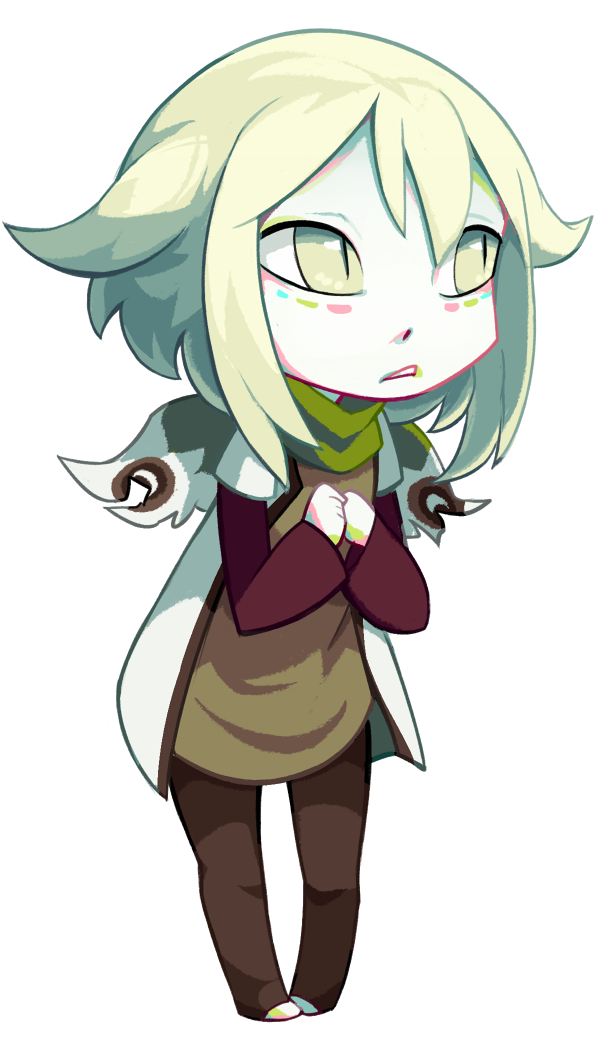
personality
Every minute of every day, Arsene struggles in a deep, black sea. Its currents swell and recede around him, but like he were a ghost, superimposed, pass through his chest without contact. He kicks and he claws, but his feet purchase air and his fingers scrape shadow. Flickering on a billowing curtain, he is a shade in an unlit room, just slightly dimmer than the ambient darkness.
Then a light reams through the shadow. And his knees thunk to the floor, and his veins pulse through him like thunder, and he gasps air tangibly. The most beautiful thing in the world cradles his chin and breathes the sun into his lungs, his heart, his bones, so full and warm he could cry.
And that’s how Arsene sees Camellia.
Still following his basic programming as Miquir, Arsene adores Camellia and consumes his love like a drug. Only Camellia’s happiness, praise, and affection alleviates the all-encompassing sense of worthlessness that pervades Arsene, with fear and insecurity arising the second this flow of attention falters. Though he worships Camellia above God, Arsene’s possessiveness and jealousy prevent him from fully subordinating his desires under Camellia’s. Rather than just selfishness, Arsene regards his inability to love everything Camellia loves, and his inability to always act in Camellia’s sole interests, as indicative of some fundamental defect — though he cannot explain why he feels this way.
Otherwise, Arsene is a very passive, soft-spoken, and unobtrusive individual. Inclined to serve others, indeed dependable and hardworking in his service, his word and promises are reliable. A bratty, childish quality facilitates his tactlessly honest observations, which, although overwhelmingly simple, rarely miss the heart of the matter. Complex ideas confuse him and poetic thinking eludes him, as he is rather simpleminded and inept at anything more than straightforward tasks. Still, he’s a good caretaker and very sweet, affectionate, and playful at his best, which he hasn’t been at for a millennium now.
Miserable and lonely, he’s been stewing in a thousand-year tantrum ever since Camellia died. He wants nothing to do with anyone but Camellia, thinks nothing positive about anyone but Camellia, and vents his misery by making others miserable too. Still, he far prefers sitting and thinking about Camellia to actually tormenting anyone, so despite his meanness, he's rarely dangerous.
His hatred of humans rivals his hatred for himself, too tiny and broken to fulfil his only purpose.
And if anything else could fill that void — well, Arsene hasn’t seen it.
powers
TRUE IMMORTAL CONSTITUTION
Arsene is a spiritual creature unbound to physical reality. Though he may manifest avatars of himself in reality, truthfully he is and occupies a higher, purely conceptual dimension composed only of himself. This dimension is expressed physically as a void and as the empty space between objects. Arsene’s influence is present wherever such places exist, but his existence does not rely on them.
He regards reality the way we might regard a video game, with an entire dimension separating us from the events on the screen. That said, when he exists in reality, he is genuinely existing there, both generally and through the perspective of his avatar. Though it is still just an avatar, and forces that influence it do not influence Arsene.
Physical Manifestation
Arsene typically manifests his avatar in humanoid shape. He is supernaturally fast and strong, and more durable than a regular human. He doesn’t need to eat, drink, sleep, or breathe, but enjoys doing these things. His avatar can die if sufficiently damaged, but Arsene can just manifest himself a new one.
His spiritual form is a giant, feathered, iridescent snake. He can manifest as a snake, but prefers not to. He considers snakes ugly.
SPACE POWERS
Arsene has crazy, insane, ridiculous space powers beyond the scope of human comprehension. As I am but a sad third-dimensional monkey I cannot catalogue them comprehensively, but here are a few I can manage:
He can disable reality’s collision detection, distort euclidean forms into non-euclidean forms, twist the geometry of objects, twist motion vectors, shorten or elongate distances, and reliably navigate distorted space. Things do not obey conventional laws of 3D form, motion, distance, or physics if Arsene feels like breaking them.
KENOMA AVATAR
Arsene is an avatar of Kenoma, the primordial force of nothingness and separation that individuates concepts into physical existence. A void the size of the universe radiates from Arsene that forms the space all objects exist in. This makes Arsene’s presence necessary for stuff to exist, in general.
Kenomic Reality Warping
Arsene can warp reality by dividing, merging, and reinterpreting the conceptual properties of existing material. But he sucks at abstract thinking, so he struggles to consciously warp anything. He doesn’t bother to try anymore.
Unconsciously, Arsene is always warping reality. His thoughts, moods, emotions, and desires passively alter everything in his environment. These changes usually occur subtly over long periods of exposure, but if Arsene’s emotions peak, they can be abrupt and dramatic.
As Arsene’s mood is often negative, the alterations he incurs are often negative. His corrupting presence magnifies the worst sides of people, minimises their good traits, and eventually twists them into monsters, both metaphorically and literally. Influenced by his hatred of humans, things he corrupts typically become hostile towards humans specifically.
relations
Camellia
master
The rest of the world can get screwed. All that matters is Camellia.
Wake up, what does Camellia want for breakfast. Well, first of all, how’s his mood? Does he need a little more sleep. Is Camellia’s pillow fluffy enough. No, he looks energetic. Wonderful! So what’s his plan today? Does he want a suggestion? Then what’s something fun Camellia would like… oh, no, he’s got something. Great! But what could it be? Oh it’s so exciting. Camellia is so great. Hug him. He’d love it. Hug him. Yes. Like that. He’s so warm. He’s smiling! Camellia. Camellia. Camellia Camellia Camellia Camelliacamelliacamelliacamelliacamellia
Camellia’s not here anymore.
He’s not here anymore, but he is. Camellia’s psyche still exists, which shames Arsene. He couldn’t even kill him properly. He couldn’t even do that properly. Of course not… couldn’t even deliver him properly. And now he’s dead and still playing with his stupid humans.
With that in mind, Arsene misses Camellia. He hopes desperately Camellia will return home, or at the very least, give any indication that he’s still thinking of Arsene.
Miquir
self
Did this even happen?
Thinking about it feels like a weird fever dream. Arsene prefers not to investigate it.
renard
annoyance
Wait, who? Oh, right, him.
This is the jerk that slashed open Camellia’s tree. Ugh! You can still see the cut. Stupid humans can’t stop themselves from being pests, even with all of Nix separating them from Arsene. It’s disgusting…
Camellia wanted this guy alive, though, so Arsene leaves him alone. Never thinks about him either. 100% Camellia-designated brainspace.
zachary
huh?
What?
trivia
public perception
Well-regarded and trusted as the Demiurge’s servant in the Glen. Extremely reliable and more approachable than Camellia, as he’s smaller and quieter.
Near-universally hated since killing Camellia. Understood as man’s fundamental enemy, though time has dulled his legacy and introduced some scepticism as to his existence. Rebellious teens love him.
in fights
Extremely passive. Typically doesn’t start fights or want fights. Teleports most aggressors away.
Very nasty when he does fight, though. He’s extremely straightforward and readable, but his raw power is crazy.
romance
Incapable of romance. He’d only care about Camellia anyway. Thinks human romance is GROSS.
hobbies
Simple chores, like cooking, baking, laundry, and gardening. Domestic stuff.
misc. trivia
- Arsene doesn’t know where he came from. People assume he’s a creation of Camellia’s, but Arsene disagrees. Camellia wouldn’t make something as flawed as him.
- His perception of time is abnormal. He simultaneously feels that single moments last decades, while centuries feel like months.
- He radiates no body heat, as he’s cold-blooded.
- Can taste smells and smell heat. Doesn’t like mentioning it because it’s weird.
- Has no interest in claiming a wish from the camellias. Would rather one fell naturally for him, as it would show Camellia still thinks of him.
- His nickname for Camellia was Cammy, which humans immediately misheard as Camille. The name of the Demiurge of Aurholm is hence recorded as Camille. Indignantly jealous that people had stolen his pet name, Arsene took to calling him Leah instead.
- Similarly, humans misheard Our Home as Aurholm. Arsene remains salty about losing Our Home.
- Likes soft colours, soft fabrics, and sweet foods. Enjoys feeling cute for it, but also genuinely likes them.
meta/crack
gallery
arsene
信じるだけで


